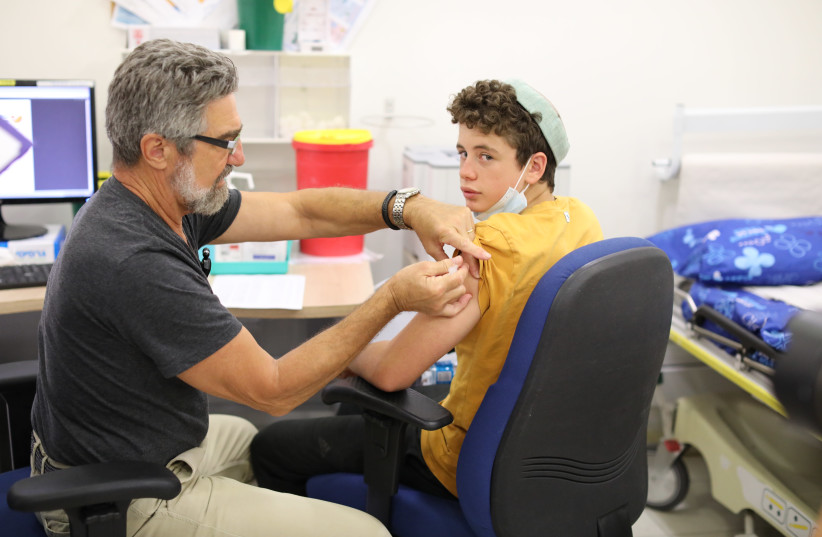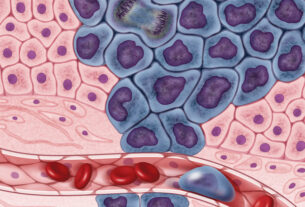
Israel has ignored the World Health Organization’s recommendation that children should not be vaccinated for the moment and instead is now running one of the most stunningly rapid vaccination campaigns worldwide for youngsters aged 12-16.
While the WHO did conclude that the Pfizer vaccine is “suitable for use by people aged 12 years and above,” and that “children aged between 12 and 15 who are at high risk may be offered this vaccine alongside other priority groups for vaccination,” it also said more evidence is needed on the use of coronavirus vaccines in this population before making general recommendations.
“Vaccine trials for children are ongoing and WHO will update its recommendations when the evidence or epidemiological situation warrants a change in policy,” it said.
The WHO also said it had concerns over higher-income Western nations vaccinating their youth, while many lower- and middle-income countries have still not obtained enough doses to inoculate their high-risk populations.
Yet, as of Saturday night, more than 100,000 teens and preteens had been inoculated, the Health Ministry said, in a campaign that at least one top medical professional said could – and should – have waited.
Prof. Rivka Carmi, the former president of Ben-Gurion University of the Negev and a top Israeli pediatrician and geneticist, said as youth flock to the country’s vaccination stations inspired by a massive PR campaign being run by the Health Ministry and Prime Minister Naftali Bennett, “my take was to wait and see.”
“This is a very aggressive campaign, saying: ‘Go vaccinate – we are going to throw away vaccines at the end of the month,’” she said. “People don’t really know the facts – and they should.”
Israel stands to throw away about a million doses of the Pfizer coronavirus vaccine at the end of the month if it does not find something else to do with them. On Sunday, Bennett discussed possible vaccine exchanges between Israel and various countries with Pfizer CEO Albert Bourla. So far, a solution has not been found.
“If every kid and every parent that agreed to vaccinate their child was being given all the facts and signed an informed consent form that they understand the pros and cons, I would be much more comfortable,” Carmi continued. “The way they are portraying it on prime-time TV is not really accurate.”
if(window.location.pathname.indexOf(“656089”) != -1){console.log(“hedva connatix”);document.getElementsByClassName(“divConnatix”)[0].style.display =”none”;}
CYRILLE COHEN, head of the immunology lab at Bar-Ilan University, expressed similar sentiments.
“Vaccinating teenagers should be a personal decision,” he said. “It shouldn’t be influenced by expiry dates, free pizza or doomsday movies about side effects on the Internet, but purely by scientific facts and advice from a pediatrician.”
The country’s goal is to get as many children vaccinated as possible, Carmi said, and “I don’t agree with it… We don’t really know how safe this vaccine is for kids,” and “we don’t always need to be first” in the world.
“There is no way to get rid of the virus,” she added. “And even when you get herd immunity, there will always be pockets that will flare up, and that’s OK. Our focus should be the high-risk group.”
There are still some 200,000 people over the age of 50 who have not been inoculated.
Even with the threat of the Delta variant, which is rapidly spreading throughout the country, Israel’s health system is not at risk, and neither are its youth, who are likely to suffer from mild disease, if they suffer at all, Carmi said.
“We were the first to vaccinate the high-risk groups, and that was perfect, and I applaud the government for bringing all those vaccinations and the health funds for delivering them in such an efficient way,” she said, but “now, there is not any kind of emergency.”
When the Health Ministry first approved teenage vaccination, it made it available to those who wanted it and recommended inoculation only for people who were high risk, living with someone high risk or planning to travel outside the country. Then, as the most recent outbreak hit the country, the ministry shifted its policy, calling on all youngsters 12 and older to rush to their health funds and get the jab.
THE US Centers for Disease Control has recommended vaccination, ruling that the benefits of vaccinating teens are greater than the risks from the vaccines. Europe and Canada have also approved teen vaccination.
In contrast, the United Kingdom has ruled not to vaccinate children under 18 as of yet.
The World Health Organization, as noted, did not make any general recommendation, but rather said it was waiting for additional data, despite a decision by the US Food and Drug Administration on May 11 to give the Pfizer vaccine emergency-use authorization for people over the age of 12.
“At this point, we should have adopted WHO’s position on vaccinating kids,” Carmi said.
Israel is seeing a spike in new daily cases and a small increase in the number of people hospitalized or in serious condition. But this increase has been very slow, and there is no risk that the health system will collapse.
“The system can easily handle 100 or 200 severe cases,” Carmi said. “It is not going to crash.”
Recall, Israel had as many as 1,182 serious cases at the peak of the pandemic.
There are 1,157 students and 79 faculty members infected with the virus, the Education Ministry reported on Sunday.
Carmi said the coronavirus is “not a children’s disease,” meaning that after a year and a half, the world has learned how serious the virus is for people who are elderly or suffer from underlying medical conditions. In contrast, children tend to be asymptomatic or have very mild disease.
Few children were hospitalized throughout the crisis; out of more than 6,400 COVID-19 deaths, only nine were children – most of them with serious underlying medical conditions.
Similarly, Carmi said, people talk about the risk of developing “long COVID,” which people can actually develop even without being severely sick with the virus, and it can linger for weeks or even months. But “in the end, all kids will recover completely,” she said.
There is also the risk of developing Pediatric Multisystem Inflammatory Syndrome (PIMS), which is a multi-organ infection. However, to date, the rate of children developing this disorder is “very, very, very rare,” she said.
ON THE OTHER hand, “we really don’t know how safe this vaccine is for teenagers, especially in this period of their life, when they are developing and growing,” Carmi said. “We infer the safety [for teens] from adults, which we usually do not do. Children are not small adults.”
The FDA provided emergency-use authorization based on only 1,000 children who received the jab, she said, adding: “The fact that we did not see any adverse effects in those 1,000 means that there is not one adverse effect that impacts one in 1,000 people. But if there is an adverse effect that impacts one in 5,000, we would not have identified it.”
Carmi cited studies in Israel and the US that linked the vaccine to myocarditis, inflammation of the heart, in youngsters after the second dose, especially in males.
“The immediate reactions are probably going to be very few,” she stressed. “But we have to follow up on any side effects that might be developed later on.”
However, Prof. Nadav Davidovitch, director of Ben-Gurion University’s School of Public Health, told The Jerusalem Post that “data from the US, Canada and Israel show that the vaccine is both very efficient and safe.”
Carmi does not disagree. She stressed that she is not anti-vaccination and that she personally believes the chances that the vaccines are safe are “very high.”
Nonetheless, “there is not any reason to risk children, even if the risk is very small, when the advantage is negligible,” Carmi concluded.




